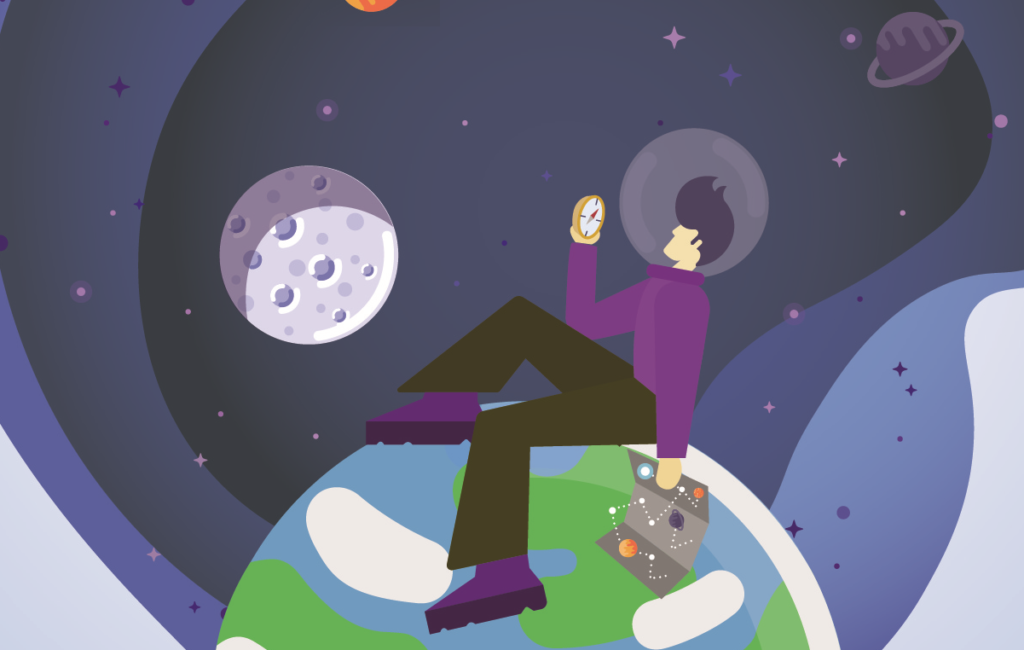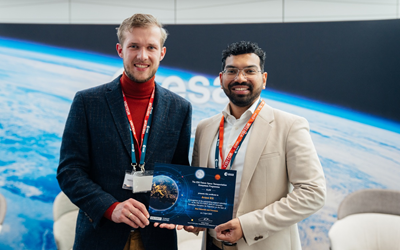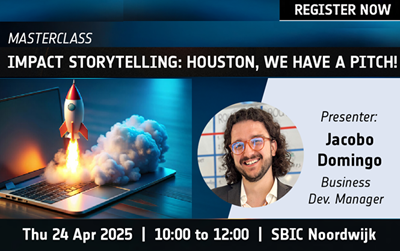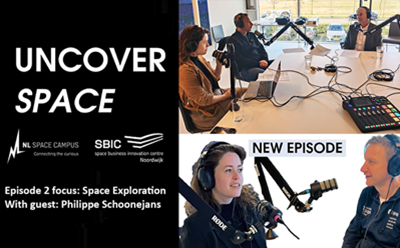SBIC Noordwijk has added Studio Carbon to its technical partner network. Embedding design into your core business strategy is vital – from working with design principles and incorporating these while building your brand narrative and moving through to the prototype phase and go-to-market. It gives you a competitive advantage. According to co-founder Itika Gupta, experiential solutions and impactful storytelling are essential for startups to bring both customers and investors onboard. Our ESA BIC entrepreneurs can now get technical support from the design studio on-hand in Noordwijk.
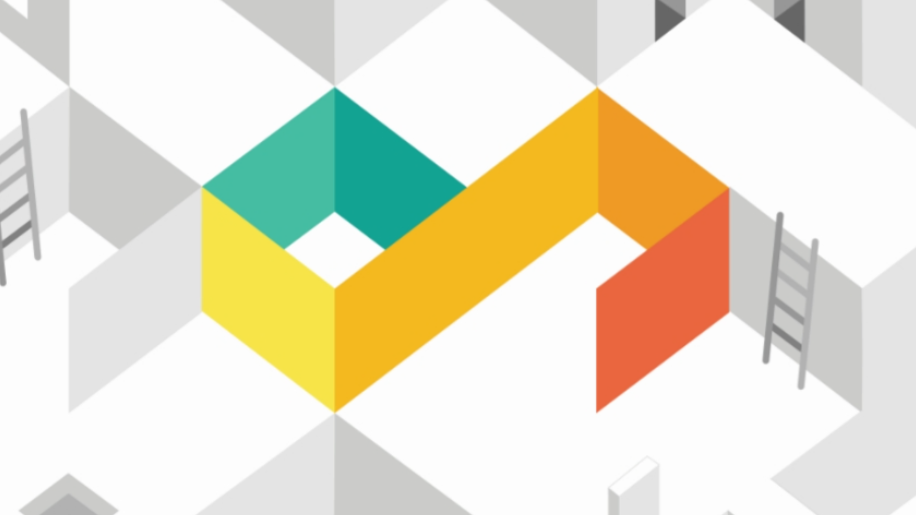
We are pleased to introduce technical partner Studio Carbon, a full-service design agency and consultancy with offices in the Netherlands and India and clients across the globe. The company’s three focus areas cover product/industrial design, communication design and user experience/interface design. Founded in 2018, the studio already has experience of working with multiple stakeholders in the space industry, so will fit right at home with the startups at ESA BIC Noordwijk. To find out what makes the team tick, we met two of the co-founders: Itika Gupta (in person) and Neel Mehta (online).
What is at the heart of your business?
Itika: The studio has a diverse team of designers, architects, engineers, educators and entrepreneurs. We founded the studio after a realisation that design, in its true sense, has the power to enable and empower any industry to become more holistic, human-centred and future-proof. Our ultimate goal is to help organisations of all kinds embrace design as a powerful tool for positive change, leading to a more equitable and sustainable future.
Neel: As the space industry is growing, it is becoming more competitive and there are many players across the globe who offer similar services. The only differentiating factor for startups is how their customer experiences their solution. To help them identify these gaps and opportunities, we invite the startups to connect with us over an exploratory meeting to understand how we can help them realise their innovation and business goals.
Itika: By using design thinking and methods, startups can bring concepts to life, making them more tangible and compelling. By prioritising design in the early stages, startups and entrepreneurs can gain valuable feedback from potential users, investors and stakeholders. This helps them to refine their ideas and improve their chances of success. Ultimately, design can play a critical role in helping startups to validate their ideas and build a strong foundation for growth and innovation.
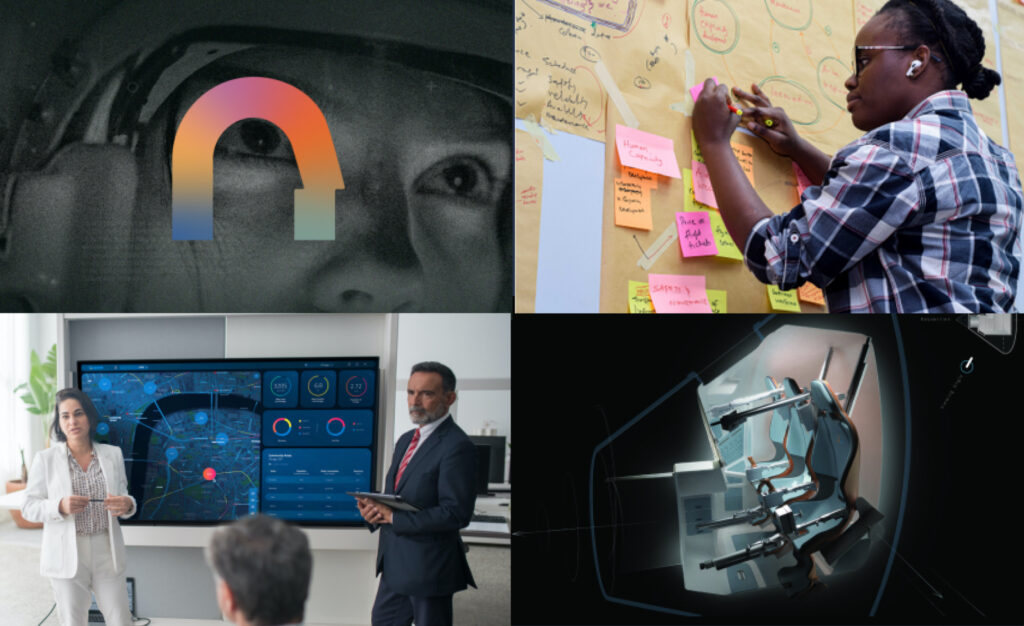
What design services does your studio offer?
Itika: We are a full-service design agency. Our industrial design team works across all stages of product development, from conceptualisation to prototyping and form development all the way to design for manufacturing. We have designed everything from bicycles and brain headsets to sewage treatment pods and shoes for space habitats. Our communication design team has mastered the art of storytelling through visuals and writing. From helping develop powerful pitch-decks for fundraising to building a brand identity that communicates your audacious vision to the world, this team’s experience of narrative building can catapult your startup’s growth.
Our third expertise in user experience (UX) and user interface (UI) design includes product development in mobile and web applications. Our future-forward UIX team understands the nuances of deep tech and excels in making complex technologies, such as brain mapping interfaces and geographic information system (GIS) maps, more accessible and usable to all stakeholders. Additionally, our belief in the power of design-centric thinking often takes the form of a short, focused activity or a multi-day bootcamp with our clients. Such workshops are designed to be immersive and hands-on, providing participants with the tools and skills they need to take their ideas to the next level.
Neel: We have worked across 20+ sectors and with 120 businesses, at all stages of growth. In the space sector, we are proud to have designed a GIS platform from the ground up, focusing on keeping users and stakeholders at the product’s core. By putting their needs first, we developed a platform that provides a seamless experience and is optimised for their workflows.
Studio Carbon Identity: “We know the question that would come to your mind. Why “carbon”? Well, carbon is the basic building block of life. It is the most versatile element and seamlessly integrates with many other elements. It is ubiquitous. An integral part of everything we see. Just like design. The logo is derived out of the letter ‘क from the Devnagiri script. Its design depicts our presence across all types of sectors and solutions.” studiocarbon.in/about-us
What can you provide as technical support to our startups?
Neel: Our studio is committed to supporting the ESA BIC community and helping startups and innovators to bring their ideas to life. We recognise that many of them are building innovative technologies. One of the biggest challenges startups face in the early stages is effectively communicating the value of their product to potential customers and stakeholders. This is where we come in. Our team is dedicated to helping startups and innovators tell compelling stories that will resonate with their audience and persuade them to support their products. By using design thinking and strategic storytelling, we help to articulate the value of the product in a way that is easy to understand and emotionally compelling.
We help startups tell compelling stories that resonate with their audience
neel mehta
Itika: We work closely with startups to identify their unique value proposition and develop a narrative to connect with their audience and differentiate them from the competition. Our goal is to help startups and innovators succeed by allowing them to communicate their value propositions clearly and compellingly. By doing so, we can play a critical role in driving innovation forward and creating a better future for everyone.
Neel: As a full-service design studio with expertise in all verticals, we are uniquely positioned to provide ESA BIC startups with a comprehensive design solution. By working with us, startups can avoid talking to multiple vendors, saving them time, effort and resources. In addition to our broad range of design services, we also understand complex and nuanced technologies. Our team members have experience working with these technologies and are well-equipped to handle the design challenges that come with them. By partnering with us, startups can rest assured that their design needs are in good hands, freeing up their time and resources to focus on their core business.
What is your link with space?
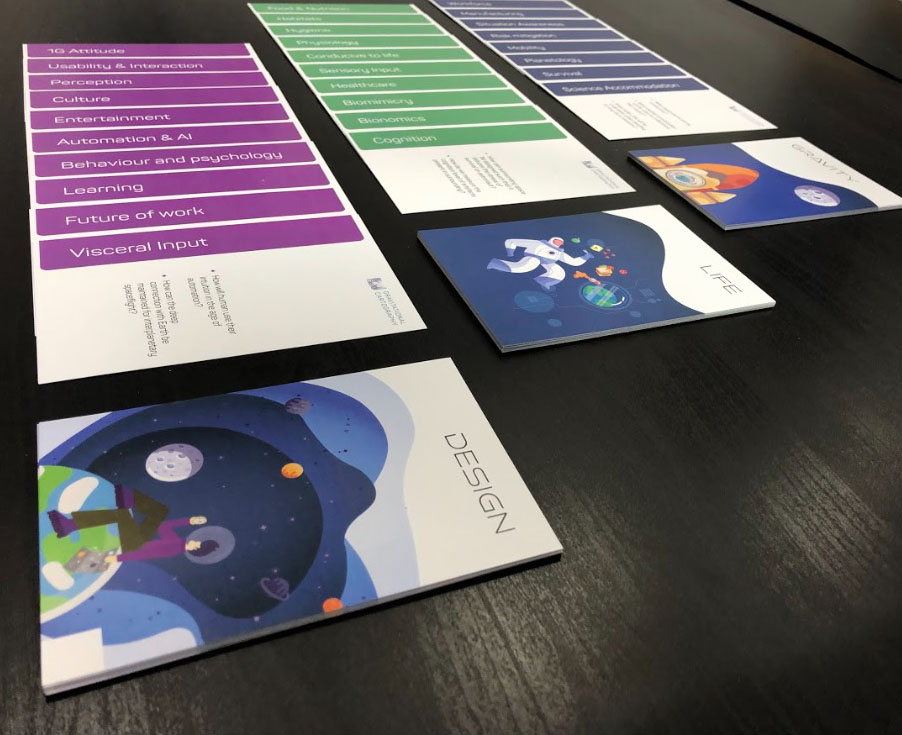
Itika: As a team, we have all had an interest in space for as long as we can remember, and for a few of us back during our education we considered about what design can do for the world – and designing for space really was the ultimate extreme we could think of.
Neel: Yes, this was a turning point. “Design in space” had not been explored, which sparked our interest. We saw an opportunity to develop our own design framework and methodology. Through workshops and presentations at events like the International Astronautical Congress in Paris, we have shared our insights on design thinking for human space flight. Our goal is to lead the way in demonstrating how design thinking can be leveraged in the space industry and beyond, and we are excited to continue sharing our knowledge with different communities.
Itika: Through our discussions with organisations, such as the Indian Space Research Organisation (ISRO) and ESA, we have received positive feedback and validation that design can bring value to their work. We are encouraged to see the industry’s response to the idea of design and its potential in space technology. Our goal is to make space technology, and conversations about it, more accessible and a part of our daily lives.
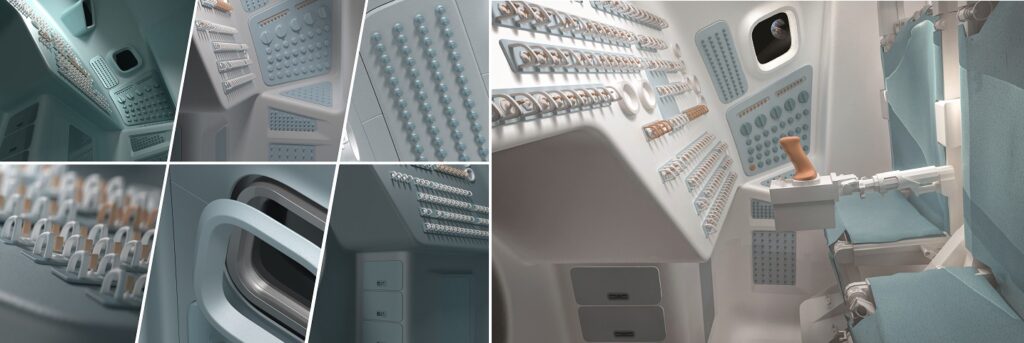
Can you share a key highlight of your studio’s design work?
Neel: Our showcase project highlights the significant impact that design can have on improving life in space. We focused on reimagining the interior of a crew capsule using design thinking as a tool to innovate and improve upon the existing design. As a result, we reworked the control panels and furnishings, using more conducive colour, materials and finishes – creating an interior that plays a crucial role in enhancing the wellbeing and performance of the astronauts.
Itika: By making the right choices for the design of the module, we can reduce the cognitive load for the astronauts and provide them with an interior that can help keep them healthy on their journey through harsh space conditions. Our team is dedicated to using design to drive innovation and help solve complex challenges in space and other industries. Our showcase project demonstrates how design can make a meaningful impact on people’s lives, even in the most challenging of environments.
Our goal is to make space technology, and conversations about it, more accessible and a part of our daily lives
Itika gupta
What other space-related projects have you worked on?
Neel: A major touchpoint for the space industry comes from satellite imagery and we work with clients who use this data to help them and to build a great user experience for their customers. Many startups work in downstream applications using such data and imagery and we see a good amount of synergy there. So, we can build new applications and platforms to utilise those algorithms and display the data in a unique way.
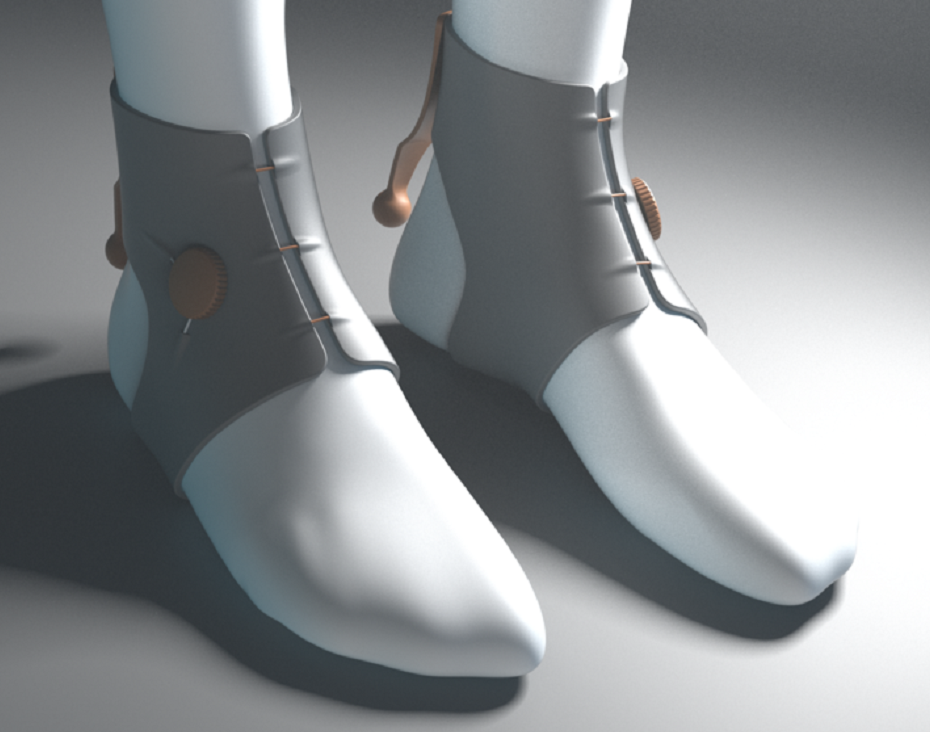
Itika: Working with various startups and a foundation in India, there are plans to create an analogous habitat in an extreme environment in India – to create a Mars-like test location. This inspired us to create a footwear prototype in-house, which was designed for use in space. We created a movie simulation to present the product at conferences and received a lot of feedback from astronauts themselves, and then we tailored it further to come up with the final design. This was something that we did from our own knowledge, not for a client. It was something we felt deeply about and we just said let’s just make it and show the world what can be done.
Studio Carbon Lab: There are a number of consultancy ventures that the award-winning Studio Carbon team is working on in-house: one is the working in sustainable materials (made out of cow dung) which started in the Netherlands and you can watch Itika’s pitch about it on the website from What Design Can Do (2022); another venture relates to training centres for sports technology; and there are more in the pipeline. studiocarbon.in/lab
What are your design ambitions in relation to space?
Itika: We have a number of “what if” scenarios. As designers, we think a lot about the future of space and what we dream of realising through design. Such as:
- What if the fourth industrial revolution was entirely implemented in human space exploration?
- What if humans could drop all their biases and inhibitions as earthlings when designing technologies for space?
- What if we defined a holistic intent and purpose to building space habitats?
- What if space exploration could leverage on cultural differences to improve well-being of astronauts?
What’s your message to our startups about reaching out?
Itika: Don’t hesitate to get in touch – whether by email, phone or in the Slack chat. There are multiple areas where we can help the ESA BIC community and it really depends on what phase the entrepreneurs are at and how far they are on their journey as a startup. A 30-minute call is all it will take for us to chat and really understand what we could do for them. We can meet up at SBIC and from then, things can move very fast in terms of the startups discovering what we can offer them and for us to understand what their needs are and to find the best solution.
Email: itika@studiocarbon.in
Website: studiocarbon.in
The ESA BIC incubatees will have a personal introduction from Studio Carbon during the info session on 14 March to discover the design opportunities available for our space business startups!
We will also be holding a workshop in May, which will be open to our wider community and external audience. To be kept informed, you can sign up for news (and click the checkbox relating to events).
Related post:
Studio Carbon wins third prize in ESA Technology Transfer Competition
[Studio Carbon finished as a partner of SBIC at end of Oct 2024]
